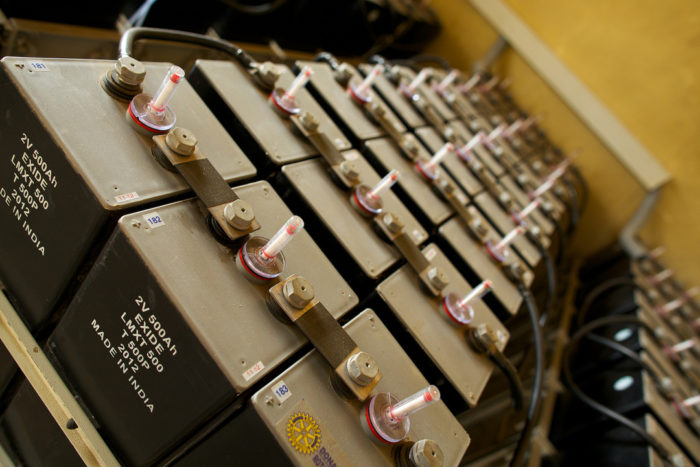
Image Credit: Rob Tinworth via Flickr
The Internal Revenue Service has ruled that batteries added to a residential solar system as part of a retrofit qualify for a 30% federal tax credit, but the decision has only a limited impact for now.
The homeowners who made the request aren’t identified by name. They requested the IRS ruling last year after adding batteries to a grid-tied photovoltaic system they had installed earlier. The batteries — with a capacity of 13.5 kilowatt hours and a power rating of 5 kW — were wired into the system so they could only be charged by the solar panels, not by grid electricity.
With that in mind, Peter Friedman, a senior technical reviewer, granted the request for the tax credit. But, his letter added, “this ruling is directed only to the taxpayer who requested it.”
Greentech Media, which first reported on the ruling, called the decision a private letter ruling in which a decision is issued in response to a written request from a taxpayer and “may not be relied on as precedent by other taxpayers or IRS personnel.”
Under those conditions, it wouldn’t seem as if the ruling would have much if any impact on homeowners at large.
But the article quotes Brett Simon, a GTM Research analyst, as saying the ruling has a lot of potential for solar installers looking for new opportunities in the market. “It’s just a single case,” he said, “but is nevertheless important because it reveals how the IRS views retrofits, and could lead to a future guidance that allows for all retrofits of storage to take the ITC. If that happened, the floodgates would open.”
An article in Solar Power World says that the IRS “has ruled privately on multiple occasions that storage devices including batteries are eligible” for the tax credit. It cites private-letter rulings in 2011 and 2012, but points out the rules are more restrictive for “dual use” equipment, which stores electricity derived from more than one source.
Inside Climate News said taxpayers should be able to “rest easy in taking the tax credit” as long as the batteries are charged only by solar panels.
Kelly Speakes-Backman, CEO of the Energy Storage Association, said the ruling “marks a milestone” for the solar-plus-storage industry.
“The 30% credit is like jumping ahead five years on the cost curve for home battery systems — so on that count, customers will be able to afford longer-duration systems sooner and present greater opportunity for self-reliance,” she told the website.
Under current rules, the 30% investment tax credit begins to drop in 2020 and expires altogether at the end of 2021.
Weekly Newsletter
Get building science and energy efficiency advice, plus special offers, in your inbox.














2 Comments
Would this 30% tax credit
Would this 30% tax credit also apply to the cost of replacing batteries in a pre-existing solar system which is charged only by solar panels?
qualified "yes"
Hi David,
The principal inherent to the decision in the private letter supports a positive answer to your question, but the private letter ruling has no precedential value so the IRS could find just the opposite. This isn't bureaucratese—just a sign that the issue is fairly new and unsettled for the IRS, so they reserve the right to make a policy decision at a latter date.
The safest approach would be request answer from them directly. If you're up for it, you can learn how here: https://www.irs.gov/tax-exempt-bonds/teb-private-letter-ruling-some-basic-concepts. It looks like the cost is $275.
Log in or create an account to post a comment.
Sign up Log in